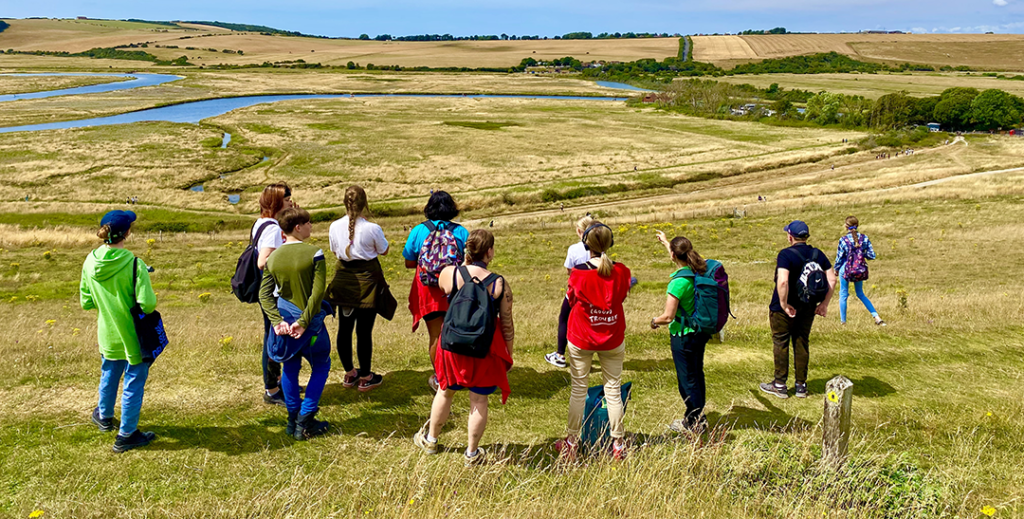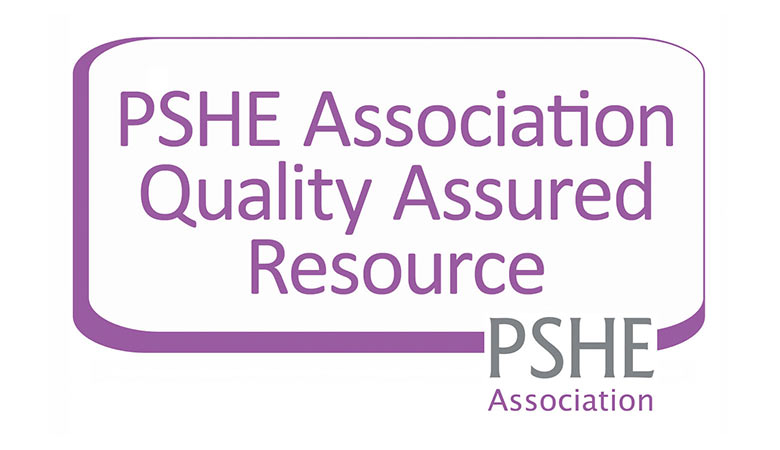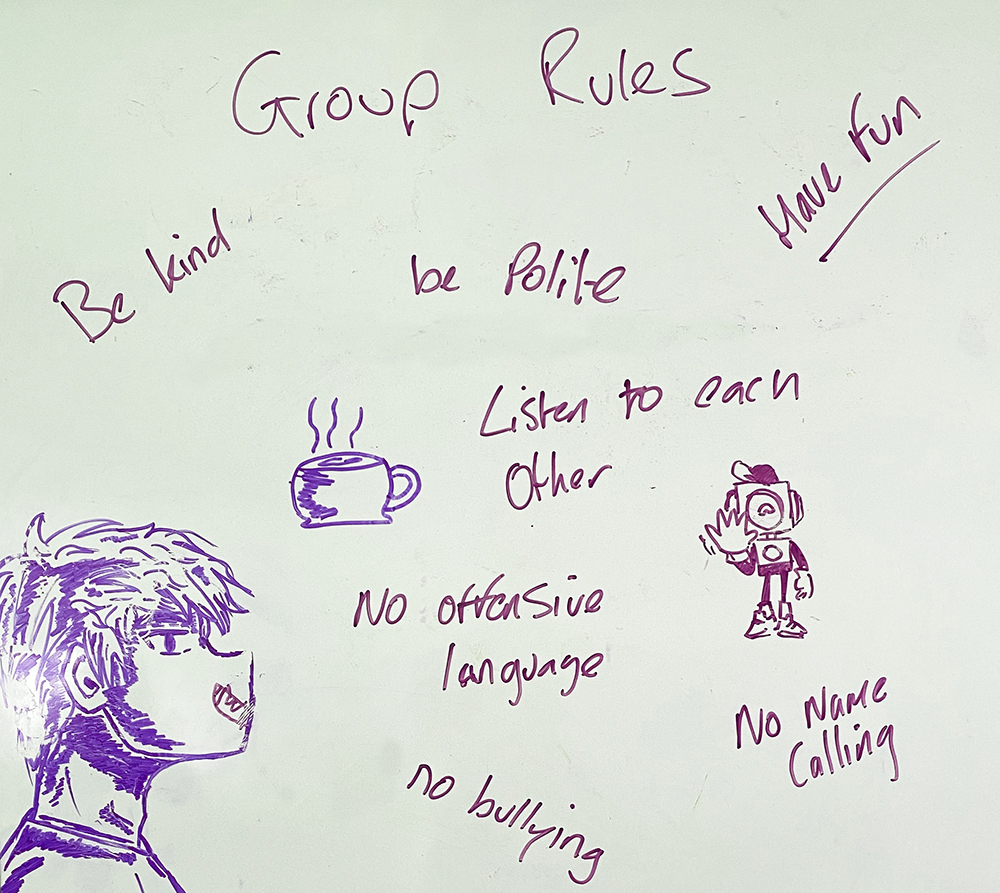Our activities and impact
Make (Good) Trouble (MGT) works alongside a diverse range of young people and families, opening up new paths of access to professional support for mental health and emotional wellbeing, during and post-Pandemic.
All the projects we have been involved with this year have been to further our goal of improving wellbeing and outcomes for young people and families. Our activities have helped us to highlight the issues that affect young people, and many provided them with a platform to share their views and have a say in initiatives that would affect their future.
We were delighted to welcome three young people through the Kickstart scheme to MGT, and we have provided them with employment, mentoring, and vocational training in media production and project management. One of these placements is now a part-time member of staff. The Kickstart scheme is provided by the Department of Work and Pensions (DWP) and Brighton & Hove County Council, and run by Brighton Dome & Brighton Festival (BDBF). It provided paid work placements for 16 to 24-year-olds claiming Universal Credit. MGT is one of 20 local organisations offering over 80 work placements in the arts, publishing, PR, digital media and other creative opportunities.
“Being a part of this Kickstart job has given me so many more opportunities than I thought I would get with other jobs. I feel like I’m able to be a lot more creative with the support of my colleagues and get exciting opportunities to work with young people. Working on the Holiday Activities and Food project for Make (Good) Trouble has made me realise how important youth is for young people, they need a safe space to be allowed to just be themselves with no judgement and have their basic needs met that they might not get at home. It is definitely the sort of enrichment that would’ve helped me when I was young, it’s also really rewarding being there for those kids that need a role model to talk to. Covid has halted so much development and opportunities, it’s great to be part of something that is making an actual difference and helping young people get back out and trying new things.” – Hamzah Ali, Kickstart employee, Dec 2021
We continued to build on our post-lockdown work, supporting families and young people. In December, we moved into an office in Brighton so that our team could work together face-to-face after the isolation of lockdown
Make (Good) Trouble is accredited on the Digital Badges scheme as part of the Brighton Cities of Learning programme, and we awarded 63 Digital Badges to young people across the South East of England.
Raising Teens
We continued developing our Raising Teens brand this year, which aims to help parents and young people to understand each other better and to raise awareness of issues that matter most to young people. The brand includes: a closed Facebook group to support parents, a series of Facebook live-streamed Q&As, and a fourth series of our popular BBC radio show.
Raising Teens Facebook Group
We continued to support parents and young people, post lockdown, with families facing issues coming out of the pandemic, a rise in child anxiety and concerns about going back to school.
Group membership rose to over 1,700 from 41 different countries. The group had 1.4 posts a day on average (10 a week), with 73% from people in East Sussex.
Raising Teens BBC radio show
Series four of our BBC radio show, Raising Teens, aired in February 2022. This series looked at issues around safety, drugs and pressure at home. It was broadcast on BBC Radio Sussex and Surrey every Monday in February 2022, and supported by Sussex Police.
Raising Teens is a warm-hearted and honest round-table discussion about parenting teenagers and teen mental health. First broadcast on BBC Radio Sussex and BBC Radio Surrey, in 2019, the show is hosted by presenter Guy Lloyd and includes teens’ own stories from Make (Good) Trouble’s young reporter Lola Ray, with additional reporting from our Kickstart employees Xenith Pocknell and Hamzah Ali. Lola’s teen stories are surprising, thought provoking and often delightful. The show aims to bring parents, carers, experts – everyone involved in raising teens – together to dispel myths around teen mental health and offer practical help and tips.
Raising Teens Facebook Lives: Q&As Families and Alcohol
Our series of Raising Teens Facebook Live discussions about alcohol and how it affects families was developed in association with Brighton & Hove’s Back on Track service, which offers support for families when a parent is drinking too much.
We were joined by practitioners from RU-OK? and Oasis Project as well as those directly affected by issues with alcohol addiction.
· Teen drinking
· The impact of parental drinking
· Conflict and language around alcohol in families
Well known guests Dave Wilson aka Sober Dave, and NACOA ambassador Josh Connolly spoke to us for the live streamed Q&As.
The 4 livestreamed Q&As reached over 16,300 people and generated over 11,500 engagements.
Trauma-informed approaches to working with young people: Training
Working with partner Oasis Project, we developed a brand new virtual training course for professionals working across Sussex. This course helps to educate and inform professionals about trauma-informed practice by increasing awareness, promoting best practice and offering ways to support young people.
Topics include understanding adverse childhood experiences, how trauma affects the brain, intersectionality in practice, working with families and vicarious trauma and self care.
We’re really proud of our youth-led team who collected trauma recovery narratives from young people, co-produced filming, editing and animating.
The course had 370 sign-ups between January and February 2022 from professionals across Sussex and beyond.
Participant feedback:
“I have done a number of introductory courses on trauma-informed practice and ACE’s but felt the filmed conversations and inclusion of young people’s experience particularly helpful. I felt the training was practical and informative. This was excellent training that I have already recommended to colleagues.”
“I found the conversational style videos with the short clips from young people really helpful, it was enough of a change of pace to keep me engaged. I also felt that the facilitators showed real empathy while still being professional and educational while discussing very difficult situations.”
“The length was fantastic and the pace was really engaging. I enjoyed the diversity of voices and inclusion of young people’s experiences was so powerful.”
“Inclusion of young people’s experience was very moving and made it very real. Breaking it into sections was helpful. Good selection of people conducting the conversations.”
“I think this is a credible introductory course and I hope more teachers access it – I think this could transform classrooms and the lives of young people.”
Holiday Activities and Food programme (HAF) for East Sussex County Council
Summer and Christmas Clubs
Make (Good) Trouble joined the Holiday Activities and Food (HAF) programme and ran clubs and activities over Summer and Christmas 2021, commissioned by East Sussex County Council, providing young people in East Sussex with a safe, enriching environment in which to play, learn and unwind. There was a focus on active learning and nutrition with children and young people making food together.
Our Summer and Christmas Club provided fun and creative Media Production sessions led by young people. They put those skills to the test when they interviewed Children’s Minister, Vicky Ford and Children’s Commissioner for EnglandDame Rachel de Souza for a feature on ITV News Meridian. We also created a news feature for BBC Radio Sussex & Surrey created by our young reporter with interviews by children from our club. They discussed the importance of the club and the support of the HAF scheme.
The young makers who attend our clubs were awarded Digital badges for their CV on completion of this project. Make (Good) Trouble is a partner of the RSA Cities of Learning programme, designed to provide practical pathways to employment. In 2020 we awarded 54 Cities Of Learning Digital Badges, accredited by City and Guilds, to young people across the South East.
Feedback for MGT’s Holiday Clubs
“Amazing. Thank you so much” Parent feedback, December 2021
“I’m gonna miss everyone a lot, including the grown ups!” Attendee feedback, Summer 2021
“I’ve been coming for the whole summer (4 weeks), I was meant to go on holiday but decided to stay at the club instead.” Attendee feedback, Summer 2021
“He came home happy every day and I can’t thank you enough for that.” Parent feedback Summer 2021
“I think the fact that there was a taxi offer was incredible for me, because I’m disabled. So though, I do have a car, driving up and down and up and down, that’d be four trips for me, it would be a lot. So that’s been an incredible bit of funding.” Parent feedback, Summer 2021
“She’s got lots of things to tell me at the end of the day – the fact that she’s been trying new things, particularly the photography because she’s been talking about wanting to do GCSE photography forever and I’ve been a bit like, okay, I don’t know where that’s come from. So the fact that she’s had an opportunity to try this out for herself and has just loved it is really, really great, because it could be more than a hobby for her.” Parent feedback, Summer 2021
HAF peer-led review and evaluation
Make (Good) Trouble visited HAF Clubs across East Sussex in December. Using our peer-led approach, our young producers recorded audio interviews with children aged between four and 16, as well as parents, carers, providers and youth workers. The report, written for the council and the Department for Education, importantly elevated the youth voice and set out recommendations to help improve and streamline provision, including ways to raise awareness of the programme, and encourage the sharing of expertise and information among Club providers. Many of our recommendations are now being implemented.
“To be honest with you, when this last Club is over, I’ll be pretty sad because I like coming here.” HAF child participant interviewed by Make (Good) Trouble.
Make (Good) Trouble created a special film celebrating the success and demonstrating the positive impact of the Holiday Activities and Food (HAF) programme in East Sussex over the summer of 2021.
“The peer-led review of the Holiday, Activity and Food (HAF) programme have been incredibly valuable to demonstrate the value of the project. By working collaboratively with activity providers and speaking directly to the young people and their families, Make Good Trouble were able to capture the wide ranging positive impacts of the programme. Alongside each report, Make Good Trouble also created a short celebratory film, incorporating photos, videos and audio testimony from young people who attended. These films were able to capture the positive impact on young people’s physical and mental health and have proved a valuable tool to promote the programme to schools and other local organisations.
“As 2021 was the first year of HAF provision in East Sussex, it was incredibly important to be able to capture what had worked well but also identify areas for improvement to inform planning for future delivery. This became particularly important for Winter provision as by then the programme had been funded for 3 more years. The recommendations from the reviews, shared with both the HAF internal working group and external partnership advisory group, have been instrumental in helping to set the direction the HAF programme will take in 2022 and beyond.” – Ben Baker, HAF Programme Project Manager, Equality and Participation Team, Children’s Services, East Sussex County Council (Feb 2022)
VRU Podcast in partnership with The Trust for Developing communities
In July, we worked with the Trust for Developing Communities, a local youth work charity, and a group of teenagers from Brighton & Hove to create a series of podcasts. Created during the Covid lockdown, the teenagers discussed youth violence in their city with Sussex Police officers.
Titled ‘We Ain’t the Same’, the series explores the relationship between young people and the police. It was launched on Spotify in July 2021.
This project was also supported by the Sussex Violence Reduction Partnership.
The Rez for the University of Sussex
Make (Good) Trouble was commissioned to create and distribute content to raise awareness of The Rez, a comic book and podcast series developed by UK Comic Book Laureate Hannah Berry and a team of writers and psychologists, including Robin Banerjee, Professor of Kindness and Head of Psychology at University of Sussex.
The Rez contains pro-social and emotional well-being messaging about friendship and kindness, designed to help young people prepare to negotiate emotional difficulties and stresses.
We developed a one-day focus group for the University of Sussex, inviting primary age children to assess the effectiveness of The Rez. For our focus groups, we put together fun, interactive and creative sessions to discover what children think. We conduct interviews with children (in groups or on their own, whatever they are comfortable with) as well as taking photographs of the children which may be used for research and promotion, with permission.
For The Rez, we distributed 220 comics and 20 T-shirts to schools across Sussex. We created targeted social media content to support the launch of The Rez, organising a one-day photoshoot to generate images and video of young people reading the comic, and discussing why they felt it was important to them.
We also began work on a PHSE submission, developing school lesson plans to encourage schools to engage with the messages in The Rez. This work is in progress.
Back on Track foreign language films for Oasis Project
We have worked with charity Oasis Project to create a series of foreign language films aimed to help those affected by problems with alcohol. The videos were aimed to help parents affected by problems with alcohol and created in Russian, Polish and Hungarian.
Talks and business networks
We have participated in and contributed to talks and local business networking activities with the aim of forging strong links with the community. Founder Daisy Cresswell has given talks at Brighton Chamber and Barclays Eagle Labs events.
How we involve stakeholders in what we do
We have continued to work closely with our stakeholders who are the young people we work with, as well as local parents and guardians. Our work is focused on their needs, and is designed by and for them. Young people are co-creators, and discussions with them and families are integral to every project.
Make (Good) Trouble’s peer-to-peer model means that we train young co-creators in how to ask ‘clean questions’, Mental Heath First Aid, and media production skills. We involve them in all parts of the creative process, including coming up with new project initiatives. They have been actively involved in every project from inception to delivery.
“Interviewing children in the HAF Easter Project with Make (Good) Trouble was a really eye-opening experience for me. I was able to see a side of life that I had been somewhat sheltered from previously, and although it upsets me still that millions of children across the UK don’t have the same level of access to food and activities like I did growing up, I was so happy to see the benefit the HAF programme had on them. They all clearly loved it, and were taking part in things they wouldn’t be able to normally. I’m so grateful to Make (Good) Trouble for letting me work alongside them, and feel genuinely proud of this project that helps kids in such a way.” – Amelie Anastasakis (15), East Sussex Youth Cabinet April 2021
Parents and guardians have been a big focus for 2021/2 post-lockdown, and as we come out of the pandemic. We have listened through social media and other listening initiatives, for example the Raising Teens in Lockdown Facebook group, which we manage entirely ourselves. This has been an excellent platform for picking up on concerns early – for example anxiety in young people, drug use and schooling. We regularly post questions about concerns, and often parents and young people will offer their own views and thoughts.
Stakeholders are also youth workers and teachers and public health teams. We have been involved in consultations with Local Authorities (East Sussex, West Sussex and Brighton & Hove) on a regular basis as well as through our school and FE college networks. These consultations have resulted in new project development as well as support and advice for vulnerable communities and families in Brighton & Hove, East and West Sussex and beyond.




